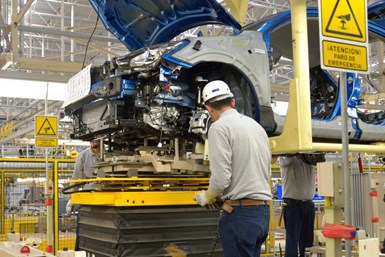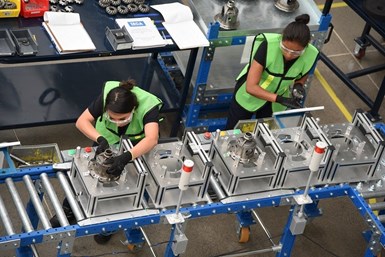 Foto: Gobierno de Guanajuato.
Foto: Gobierno de Guanajuato.KPMG has reported that the Mexican manufacturing industry has made progress and sustained itself in the wake of the COVID-19 pandemic. It also stated that this sector has demonstrated great resistance to the various crises in the market and economy of those countries to which it provides locally manufactured products.
“As for foreign direct investment, even though it stopped because of the pandemic, it is expected to continue growing and reach the levels of recent years soon,” the firm states. “It is essential to remember that in the face of the pandemic many companies had to stop their operations partially or totally, temporarily halting new projects. However, once manufacturing activities resumed, the flow of foreign investment in current and new operations in the country continued.”
"The industry has shown great resistance to the health crisis, as it not only managed to retain a large number of jobs, but continued to grow,” KPMG adds. “It is expected that the number of direct jobs will soon reach and surpass the number that existed before.”
Otro tema preocupante para la industria fue la situación del tratado comercial de América del Norte, detalla el documento, en especial las dudas sobre su aprobación y los términos en los que se daría.
 Foto: Gobierno de Guanajuato.
Foto: Gobierno de Guanajuato.One worrying issue for the industry was the unknown situation of the North American trade agreement: the document details, the doubts about its approval and the terms in which it would be given.
“Fortunately, in mid-2020 it was renegotiated,” the firm continues. “Although the terms and conditions have changed – especially in terms of regional content rules and compensation to the labor employed in production processes – the continuation of this trade agreement is good news. Mexico will continue to benefit greatly because it is better positioned to attract manufacturing operations and support services in the short and medium term.”
"While the most important growth could be in investments from the T-MEC, we will also see important investments from countries in Asia and Europe that seek to establish themselves in Mexico in order to enjoy the various trade agreements in force, the competitive value of its labor and the productivity that has characterized these industries,” the firm says.
KPMG states that, by 2021, Mexico’s manufacturing industry will show significant growth in sectors such as automotive, aerospace, medical and electronic products, areas in which the country has stood out for attracting efficient and competitive manufacturing operations.
In terms of innovation, KPMG says that companies are beginning to make inroads into various emerging technologies that enable them to remain at the forefront of each of their sectors. Data analysis, the use of the cloud, the Internet of Things, robotic process automation and artificial intelligence stand out as examples.
“The only negative aspect observed in the industry over the last few years is the lack of federal, state and municipal incentives to attract investment,” the firm reports. “It is often not enough to have good infrastructure in place and staff available and trained; incentives are also needed to make operations more efficient. It is imperative that governments at all three levels be more competitive in attracting new investments and recognizing that these always bring improvements in living conditions, employment and foreign exchange generation, social and economic development and knowledge and technology transfer.”
Contenido relacionado
Manufactura de implantes médicos con geometría biónica optimizada
Tres empresas se asociaron para fabricar implantes integrados de manera funcional mediante novedosos procesos de mecanizado sincronizados.
Leer MásTrends to Follow for The Manufacturing Industry in 2023
Managing uncertainty, addressing labor shortages, and boosting the supply chain resilience are some of the trends that the industry must follow in 2023, according to Deloitte.
Leer MásFITMA 2023 contará con ocho pabellones
La edición 2023 de FITMA tendrá ocho pabellones organizados por categorías de máquinas y tecnologías para permitir que la experiencia del visitante sea más eficiente y organizada.
Leer MásIndustria en México: 10 años de oportunidades y retos
En el contexto del décimo aniversario de Modern Machine Shop México, hacemos un recuento sobre el desarrollo, los retos y oportunidades de la industria manufacturera mexicana en los últimos 10 años.
Leer MásLea a continuación
Balance 2020 y perspectivas 2021: Industria automotriz en México
Comparada con 2020, en 2021 la industria automotriz tendría un incremento de producción y exportación de alrededor de 12%; el pronóstico para el sector de autopartes es tener un incremento de 22%.
Leer MásBalance 2020 y perspectivas 2021: Sector manufacturero en México
La OCDE prevé que en 2021 el PIB crezca 3.6% impulsado por las exportaciones, sobre todo de las empresas manufactureras integradas en las cadenas de valor mundiales.
Leer MásArtículos históricos más consultados sobre manufactura avanzada
Automatización, robótica, manufactura aditiva e Industria 4.0 son los temas abordados en este especial que, bajo la sombrilla de manufactura avanzada, resume las principales tecnologías a observar e implementar en su taller.
Leer Más




















